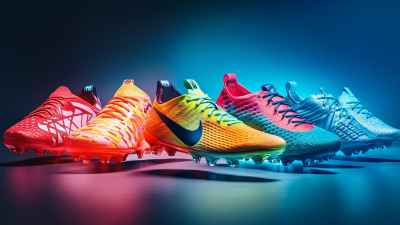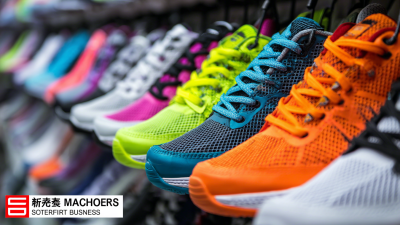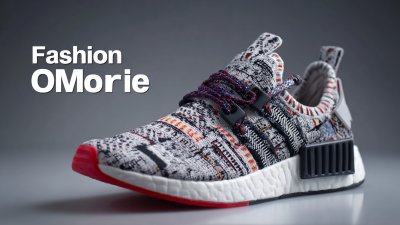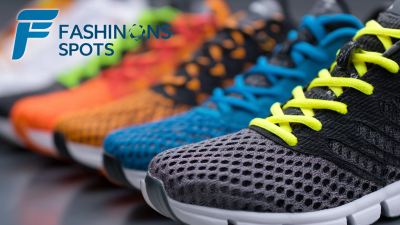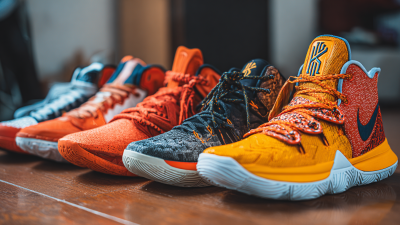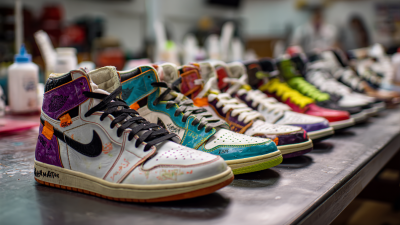
Choosing the right Sports Shoes Supplier is critical for retailers and brands looking to enhance their competitive edge in a rapidly evolving marketplace. According to a report by Allied Market Research, the global athletic footwear market is expected to reach $95.14 billion by 2025, growing at a CAGR of 6.7%. This surge highlights the importance of partnering with reliable suppliers who can meet increasing consumer demands for innovative and high-quality products. With a plethora of options available, identifying key attributes such as product quality, supply chain efficiency, and brand reputation becomes essential. Moreover, as highlighted in a Deloitte survey, over 60% of consumers prioritize sustainability in their footwear purchases, placing additional responsibility on suppliers to uphold ethical standards. Therefore, selecting a quality Sports Shoes Supplier not only impacts product offerings but also shapes the overall brand perception in a competitive landscape.

When selecting a sports shoes supplier, it’s crucial to identify essential criteria that will ensure a successful partnership. First and foremost, quality assurance stands out as a key attribute. A reliable supplier should have robust quality control processes in place to guarantee that each pair of shoes meets industry standards. Investigating the supplier's certifications, such as ISO standards or other relevant accolades, can provide valuable insight into their commitment to quality.
Moreover, the supplier's ability to innovate and keep up with market trends is vital. In the fast-paced world of sports footwear, trends can shift rapidly, making it important for suppliers to offer new designs and technologies consistently. Evaluating a supplier’s portfolio for their latest designs and customer feedback can help gauge their capacity for innovation. Additionally, good communication and customer service are essential; a responsive supplier can address concerns quickly and adapt to changing demands, helping businesses stay competitive in the market.

In the dynamic landscape of sports footwear, understanding the importance of quality and performance is paramount. As brands increasingly focus on professional athletics, the demand for high-performance running and outdoor shoes has surged. This growth is fueled by a competitive domestic market and an expanding international presence for local brands. Sports shoes that emphasize quality materials and advanced technology not only enhance athletic performance but also cater to the lifestyle of consumers who prioritize health and fitness.

With the rise of sustainable practices in the footwear industry, it’s more crucial than ever for suppliers to embody these attributes. Quality partners in the sports shoe supply chain must integrate innovative materials and manufacturing processes that align with eco-friendly standards. As sustainability becomes a vital aspect of brand identity, companies that lead with quality and sustainable innovation will undoubtedly capture a larger share of the market, positioning themselves as front-runners in the industry’s future.
When selecting a sports shoes supplier, evaluating their reputation is paramount. According to a report by IBISWorld, the global athletic footwear industry is projected to reach a value of $95 billion by 2025, making supplier credibility a decisive factor in market competition. A reputable supplier not only enhances your brand image but also ensures consistent product quality that meets consumer expectations. Key factors to consider include the supplier's market presence, customer reviews, and their track record in product innovation—essential elements that can impact your product's competitive edge.
Furthermore, compliance with industry standards and certifications plays a crucial role in assessing a supplier's reputation. For instance, the Sports & Fitness Industry Association (SFIA) reports that 76% of consumers prefer brands that prioritize sustainability and ethical practices. Suppliers who demonstrate a commitment to environmentally friendly manufacturing processes and labor practices can significantly influence retailer choices. By aligning with reputable suppliers who share these values, businesses can foster customer loyalty and enhance their market position in a saturated industry.
When selecting a sports shoes supplier, examining case studies of exemplary partners can provide valuable insights into what constitutes quality in the market. One standout example is Nike's collaboration with manufacturers that prioritize sustainability through innovative production processes. By incorporating recycled materials and reducing carbon footprints, these suppliers align with consumer demand for environmentally-friendly products while ensuring durability and performance. This commitment to sustainability not only enhances brand reputation but also appeals to a growing demographic of eco-conscious athletes.
Another notable case is Adidas, which has partnered with advanced technology firms to enhance shoe design and fitting. By employing 3D printing and custom molding techniques, they provide consumers with personalized footwear solutions that optimize comfort and functionality. This partnership showcases how leveraging cutting-edge technology can elevate product offerings in the competitive sports shoe landscape, enabling suppliers to deliver exceptional quality and customer satisfaction. As such, evaluating suppliers through successful case studies reveals essential attributes like innovation and sustainability that are critical for a thriving sports shoe business.
| Supplier Attribute | Example 1 | Example 2 | Example 3 |
|---|---|---|---|
| Quality Control Standards | ISO 9001 Certified | In-house Testing Labs | Third-party Audits |
| Material Sourcing | Eco-friendly Materials | Sustainable Suppliers | Recycled Components |
| Production Capacity | 1 Million Pairs / Month | 500,000 Pairs / Month | 750,000 Pairs / Month |
| Lead Time | 4 Weeks | 6 Weeks | 5 Weeks |
| Certifications and Compliance | REACH Compliance | BSCI Certified | Fair Trade Certified |
The sports footwear market is set for significant growth, particularly in India, where it is projected to reach $46.16 billion by 2024. This surge is primarily driven by a youthful consumer demographic and an increasing demand for premium products. Brands are keen to establish partnerships that align with evolving consumer preferences, especially as the market trends shift toward sustainable practices and innovative materials. Collaborations that focus on cutting-edge technology, such as 3D printing, are becoming essential for brands aiming to stay competitive in this rapid growth phase.
As these trends evolve, key attributes to consider when choosing a partner in this industry include their commitment to innovation and sustainability. For example, the integration of performance-driven collaborations has proven to enhance product appeal. Furthermore, leveraging influencer marketing has demonstrated immense potential to boost brand visibility and engagement, as successful campaigns resonate deeply with target audiences. The demand for quality and style remains paramount, making it essential for brands to collaborate with suppliers who can deliver on both fronts while aligning with shifting market dynamics.
